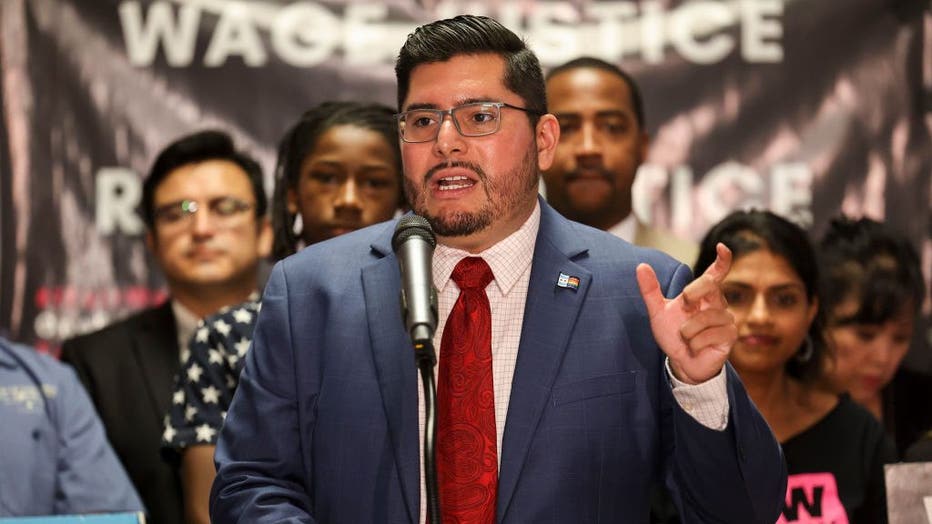City Council members to propose 2-year timeline for eliminating 'sub-minimum' wage
CHICAGO - With a progressive mayor who is a champion of the "One Fair Wage" campaign, it was never a matter of if, but when, Chicago eliminates the "sub-minimum wage" for tipped workers and how long restaurants would have to do it.
The answer will come Wednesday, when Ald. Carlos Ramirez-Rosa (35th) and rookie Ald. Jessie Fuentes (26th) introduce an ordinance that would give restaurants two years — until July 2025 — to phase out the sub-minimum wage for tipped workers.
Even though the legislation is being introduced, Ramirez-Rosa acknowledged that negotiations with the restaurant industry continue that are likely to result in an even longer phase-in period, he said.
"Folks have talked about three years and, perhaps, maybe some other tweaks to support businesses in making this change and this transition. But those are part of the ongoing conversations with the restaurant association, the mayor’s administration and the One Fair Wage Coalition," Ramirez-Rosa said.
"This is moving forward a conversation that’s been occurring in this city for quite some time. But this is not a done deal. … I’m hopeful that ongoing conversations with the restaurant association can lead to a potential compromise."
Workforce Development Chair Mike Rodriguez (22nd) plans to introduce an ordinance that would guarantee every private- and public-sector employee in Chicago one hour of paid leave for every 15 hours worked.
SUBSCRIBE TO FOX 32 ON YOUTUBE
That amounts to 15 or more days of paid time off every year for the average full-time employee — leave available "for any reason," not simply for illness.

Chicago Ald. Carlos Ramirez-Rosa speaks on June 21, 2023, at City Hall. City leaders joined the One Fair Wage movement to urge lawmakers to require a full minimum wage with tips for restaurant workers. (Shanna Madison/Chicago Tribune/Tribune News Ser
Rodriguez called it "the largest expansion of paid time off" granted by any American city.
"Working people need this time. This is normal for a lot of salaried individuals. We want working-class people to have the same benefits that all people have," Rodriguez said.
Rodriguez argued unions are gaining a foothold into businesses without unions because post-pandemic, workers are demanding higher pay and benefits and more humane treatment.
"Businesses are having trouble keeping their workers right now. And they’re having trouble with retention, which is the biggest cost for workers, particularly low-wage workers. That’s why you see Starbucks workers striking. That’s why you see UPS workers striking. That’s why you see ride-share workers trying to improve their working conditions. We are doing so with this paid leave policy," the chairman said.
"The fact is, we’re hemorrhaging people in all sorts of jobs right now. We want to be able to attract working people to our city. And this is one way to do it."
Illinois Restaurant Association President Sam Toia has spent weeks negotiating with Brandon Johnson’s administration to determine how long restaurants would have to level the playing field for tipped workers and phase out the current "sub-minimum wage" of $9.48 an hour, compared with the city’s standard minimum wage, which rose to $15.80 an hour July 1.
Toia said he feared another mandate on top of that edict.
"We can’t just keep piling all of these ordinances on and making it more expensive for the small restaurants. They’re still in a very fragile state coming out of the pandemic," Toia said.
Johnson campaigned on a promise to eliminate the sub-minimum wage for tipped workers that has disproportionately impacted African Americans in general and Black women in particular.
The only question has been and remains how long the restaurant industry will have to level the playing field.
Toia said Tuesday he has "not agreed to anything."
"I have members that have already eliminated tipped [differential]. I have members that say, ‘Get us a long runway.’ And I have members that are saying, `We need to fight this,’" Toia said.
"I do not have a consensus around this. I listen to my members. And my members are … in a very fragile state right now. And they’re not sure they can take on more labor costs and more product cost with inflation being so high. … It would be very hard for the hospitality industry to survive or prosper in the city of Chicago if you put both of these ordinances out there at the same time."
The too-many-mandates complaint is not new.
Business leaders made the same argument after former Mayor Lori Lightfoot raised the city’s minimum wage to $15 an hour, approved a predictable scheduling ordinance and imposed a host of worker protections during the pandemic.

